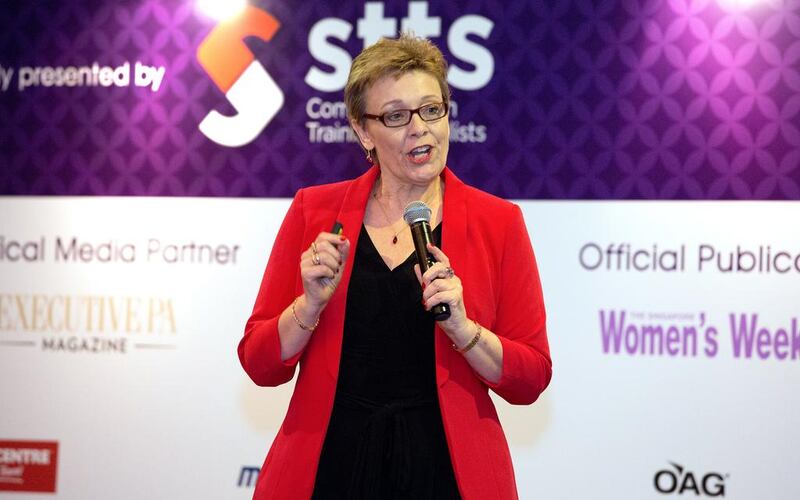Shirley Taylor is the author of nine books on communication skills with her first, Model Business Letters, Email and Other Business Documents, selling almost half a million copies since it was published in 1992. The Briton, who is from Sheffield in the United Kingdom but now based in Singapore, is heading to the Oberoi in Business Bay next Wednesday to introduce the UAE to her no-nonsense approach to business writing for a seminar hosted by the training consultancy Project Purpose.
How did you first become interested in business writing skills?
After leaving school with no qualifications at the age of 15, I followed in my mum's footsteps and went to secretarial college, where I found my niche. I remember giving a letter to my boss for signing, which he had dictated to me. He looked at it and said "Shirley, this is not what I said … but it's exactly what I wanted to say". He thanked me and signed it. I knew then that I had a leaning towards good writing skills. In 1983, I moved to Singapore to teach business English at a secretarial and business school. Part of my role was to help the school build up their teaching resources. In 1991, some publishers came and asked me if I knew the book Model Business Letters, by Leonard Gartside. I had this book on my bookshelf and had used it many times. Mr Gartside, who had written the first three editions, had died, and they asked me to revise his book. I could have fainted on the spot. I'm Shirley from Sheffield. But as the story goes, if I don't do it, someone else will.
What are the most common mistakes people make when writing business emails?
People always say to me "this is what I would say, but I must never write it". That's where they make a big mistake. Ask yourself – what would I say if I was speaking to this person? We can use contractions, because we talk in contractions. Emails are full of long-winded phrases like "please find attached for your reference and perusal", and "kindly contact me should you require any further clarification". People just copy the same style that everybody else is doing. All this is very bland template writing, like a robot speaking. I've since written four revised editions of the book, which is now called Model Business Letters, Emails and other Business Documents. Technology has moved on so much, but people are still using language that Mr Gartside used in the first edition, back in 1971.
What’s wrong with “please find attached?”
In 1981 I remember proudly showing my teacher at my evening secretarial college what I’d typed for my boss that day, which included the phrase “please find attached”. “What’s the verb here?” she asked. I said “attach”. But the verb is “find”, which is a great verb when you have lost or hidden something. But here, all you are doing is attaching a document. This makes the sentence passive. We need to get rid of passive phrases and put the person first. Instead write: “I am attaching”, or “I have attached”. You then make it an active voice instead of passive, and you sound as though you’re speaking.
But why is that important?
If you and I have never met, what I am hoping we are doing in the email is building a relationship. When you work on the relationship first, then you’ll get more business, people will trust you more, and you’ll have more credibility. I call it “writing with heart”.
What’s another common faux pas?
“Above or below mentioned”. If the subject of the email mentions a workshop, and then the body of the email reads “the above mentioned workshop will be held”, for example. Instead, I want a four-letter word – “this”. “This workshop will be held”. And with a plural word, you can use “these”. We’re just replacing old-fashioned language that somehow we’ve got into the habit of keeping.
But shouldn’t we be polite?
It’s important to use the right tone. A golden rule of writing is to get straight to the point – but that can sound blunt. You’ve got to get the balance right. I had a call from a potential client recently; we got on like a house on fire and afterwards, she wrote me an email that read: “Hi Shirley, we spoke today”. When I saw that, I felt like I’d been slapped in the face. I know we spoke, I was one of the speakers. What I would have liked for her to say was “Hi Shirley, it was great to speak to you today” or “thank you for a great conversation today”.
English is not always the reader’s first language in the UAE, should people dumb down their language to ensure they are understood?
I wouldn’t call it dumbing down, but use the Kiss principle – “Keep it Short and Simple”. Up to about 50 years ago, people used to speak in very formal language, using big words because they thought they would come across as being more intellectual. That notion has to go out the window in today’s world. We should not be writing to impress anybody, but to express ourselves, to get our point across clearly and simply.
business@thenational.ae
Follow The National's Business section on Twitter





